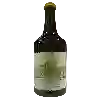
Domaine de SavagnyCôtes du Jura Poulsard
This wine generally goes well with
Details and technical informations about Domaine de Savagny's Côtes du Jura Poulsard.
Discover the grape variety: Poulsard
Poulsard is a red grape variety that originated in the Franche-Comté region. In 1732, it was qualified as a good grape variety with several others by the parliament of Besançon at the time. It currently covers nearly 300 ha. This variety has 3 approved clones: 296, 584 and 464. Poulsard has slightly hairy branches with long tendrils. Its leaves are yellow in color. Although its bunches are small, its berries are often medium-sized or larger. Poulsard is quite sensitive to scorching, spring frosts and coulure. It is also afraid of oidium, mildew and grey rot. This grape variety appreciates clayey, fat and marly soils. Its fertility is average, so it is preferable to prune it long. It buds quite early. Poulsard produces a wine with a light structure, fine and aromatic. It can be kept for years. This wine goes well with poultry, red meat, cheese and starters.
Last vintages of this wine
The best vintages of Côtes du Jura Poulsard from Domaine de Savagny are 2015, 2011, 2010
Informations about the Domaine de Savagny
The Domaine de Savagny is one of of the world's great estates. It offers 11 wines for sale in the of Côtes du Jura to come and discover on site or to buy online.
The wine region of Côtes du Jura
Côtes du Jura is a regional appellation in the Jura wine region of eastern France. Introduced in 1937, it is arguably the largest appellation in the region in terms of geographical extent. In terms of quantity, it is the second largest after Arbois">Arbois. While the vast majority of Jura wines are produced in the Northern half of the region between Etoile and Arbois, the Côtes du Jura catchment area extends some distance to the South.
The wine region of Jura
The Jura is a small wine region in eastern France that is responsible for some very special and traditional wine styles. It is close to the Swiss Jura, but quite distinct from it. Wedged between Burgundy to the west and Switzerland to the east, the region is characterized by a landscape of Wooded hills and the winding topography of the Jura Mountains. The Jura vineyards cover just over 1,850 hectares, forming a narrow strip of land almost 80 km Long from North to South.
The word of the wine: Fruity
A wine whose nose is first characterized by aromas reminiscent of the world of fruit. A wine to be drunk young is essentially fruity, but all wines offer this type of aroma in the first place, which can evolve over time, from the scent of fresh fruit to cooked, stewed, candied or brandied fruit.














